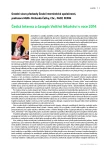Familial Mediterranean Fever – First Experiences in Slovakia
Authors:
Tomáš Dallos 1; Lucia Lukáčiková Gálová 2; Eva Macejková 3; Jozef Sedlačko 4; Nataša Toplak 5; Maruša Debeljak 6; Hasmik Sargsyan 7; Denisa Ilenčíková 1; László Kovács 1
Authors‘ workplace:
II. detská klinika Lekárskej fakulty UK a DFNsP, Bratislava, Slovenská republika, prednosta prof. MUDr. László Kovács, DrSc., MPH
1; Kardiologická klinika FN Nitra, Slovenská republika, prednosta MUDr. Pavol Poliačik, PhD.
2; Reumatologická ambulancia Bella s. r. o., Banská Bystrica, Slovenská republika, vedúci pracoviska MUDr. Eva Macejková
3; III. interná klinika Lekárskej fakulty UK a UN Bratislava, Slovenská republika, prednosta prof. MUDr. Viliam Bada, CSc.
4; Oddelenie alergológie, reumatológie a klinickej imunológie Detskej univerzitnej nemocnice Ljubljana, Slovinsko, prednosta prof. Tadej Avčin, MD, PhD.
5; Centrum lekárskej genetiky Detskej univerzitnej nemocnice Ljubljana, Slovinsko, vedúci pracoviska Mirjana Župančič, mag. med. bioch.
6; Detské centrum pre FMF Štátnej lekárskej univerzity Jerevan, Arménsko, vedúci pracoviska Arman A. Babloyan, MD
7
Published in:
Vnitř Lék 2014; 60(1): 80-85
Category:
Case Report
Overview
Familial Mediterranean fever (FMF) is the most prevalent genetically determined autoinflammatory disease. FMF significantly decreases the quality of life and limits life expectancy due to the development of amyloidosis in affected individuals. Prevalence of FMF is highest in the south-eastern Mediterraneans. In other parts of the world, its occurance is often restricted to high-risk ethnic groups. In Central Europe, experience with FMF is scarse to none, as in the case of Slovakia, where no cases have been reported, so far. Herein we report the first five patients (3 adults and 2 children, 4 native Slovaks) in whom the diagnosis of FMF could be confirmed in Slovakia. Our experience demonstrates that FMF does occur in low-risk populations in Central Europe. Due to low prevalence and lack of experience, FMF diagnosis may be significantly delayed (4.5–30 years) and undiagnosed cases are to be expected in our population.
Key words:
familial mediterranean fever – amyloidosis – colchicin – Slovakia
Sources
1. French FMF Consortium. A candidate gene for familial Mediterranean fever. Nat Genet 1997; 17(1): 25–31.
2. The International FMF Consortium. Ancient missense mutations in a new member of the RoRet gene family are likely to cause familial Mediterranean fever. Cell 1997; 90(4): 797–807.
3. Tomiyama N, Higashiuesato Y, Oda T et al. MEFV mutation analysis of familial Mediterranean fever in Japan. Clin Exp Rheumatol 2008; 26(1): 13–17.
4. Toplak N, Doležalová P, Constantin T et al. Periodic fever syndromes in Eastern and Central European countries: results of a pediatric multinational survey. Pediatr Rheumatol Online J 2010; 8 : 29. Dostupné z DOI: <http://doi: 10.1186/1546–0096–8-29>.
5. Doležel Z, Macků M, Schuller M et al. Mohli jsme být v diagnsotice rychlejší? Pediatr pro Praxi 2009; 10(4): 260–265.
6. Livneh A, Langevitz P, Zemer D et al. Criteria for the diagnosis of familial Mediterranean fever. Arthritis Rheum 1997; 40(10): 1879–1885.
7. Yalçinkaya F, Ozen S, Ozçakar ZB et al. A new set of criteria for the diagnosis of familial Mediterranean fever in childhood. Rheumatology (Oxford) 2009; 48(4): 395–398.
8. Kondi A, Hentgen V, Piram M et al. Validation of the new paediatric criteria for the diagnosis of familial Mediterranean fever: data from a mixed population of 100 children from the French reference centre for auto-inflammatory disorders. Rheumatology (Oxford) 2010; 49(11): 2200–2203.
9. Caglayan AO, Demiryilmaz F, Ozyazgan I et al. MEFV gene compound heterozygous mutations in familial Mediterranean fever phenotype: a retrospective clinical and molecular study. Nephrol Dial Transplant 2010; 25(8): 2520–2523.
10. Padeh S, Livneh A, Pras E et al. Familial Mediterranean fever in children presenting with attacks of fever alone. Rheumatol 2010; 37(4): 865–869.
11. Touitou I. The spectrum of Familial Mediterranean Fever (FMF) mutations. Eur J Hum Genet 2001; 9(7): 473–483.
12. Marek-Yagel D, Berkun Y, Padeh S et al. Clinical disease among patients heterozygous for familial Mediterranean fever. Arthritis Rheum 2009; 60(6): 1862–1866.
13. Tchernitchko D, Moutereau S, Legendre M et al. MEFV analysis is of particularly weak diagnostic value for recurrent fevers in Western European Caucasian patients. Arthritis Rheum 2005; 52(11): 3603–3605.
14. Touitou I. Diagnostic value of MEFV gene analysis in familial Mediterranean fever must still be assessed in non-classically affected populations. Arthritis Rheum 2004; 50(4): 1354–1355. [Comment on: Cazeneuve C, Hovannesyan Z, Geneviève D et al. Familial Mediterranean fever among patients from Karabakh and the diagnostic value of MEFV gene analysis in all classically affected populations. Arthritis Rheum 2003; 48(8): 2324–2331.]
15. Toplak N, Frenkel J, Ozen S et al. An international registry on autoinflammatory diseases: the Eurofever experience. Ann Rheum Dis 2012; 71(7): 1177–1182.
Labels
Diabetology Endocrinology Internal medicineArticle was published in
Internal Medicine

2014 Issue 1
-
All articles in this issue
- Familiar Mediterranean fever in Czech Republic
- Familial Mediterranean Fever – clinical picture, diagnosis and treatment
- Food intake regulation – 2nd part
- Vitamin D in relation to head and neck cancer
- International guidelines for management of severe sepsis and septic shock 2012 – comment
- The emerging pathogenesis-based strategies for treating sepsis
- Effect of alcohol consumption on cardiac electrophysiology
- Familial Mediterranean Fever – First Experiences in Slovakia
- Internal Medicine
- Journal archive
- Current issue
- Online only
- About the journal
Most read in this issue
- Effect of alcohol consumption on cardiac electrophysiology
- Familiar Mediterranean fever in Czech Republic
- Familial Mediterranean Fever – clinical picture, diagnosis and treatment
- International guidelines for management of severe sepsis and septic shock 2012 – comment
